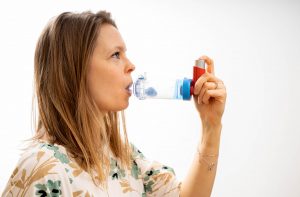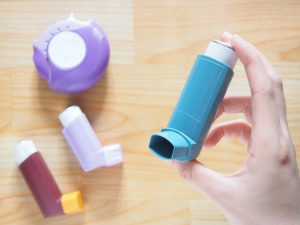Asthma article 1: Helping your child with asthma through the winter
Many people find that their asthma symptoms get worse during the winter months. This is due to the cold weather, the increased circulation of cold and flu viruses and chest infections, and increased exposure to damp and mould. It is important that children and young people take their prescribed medicines, particularly the preventer inhaler, to keep their asthma symptoms under control and prevent asthma attacks.
Many children with asthma find that their symptoms get worse during the winter. This may be because of the cold weather, or the increase in circulating viruses such as colds and flu, or greater exposure to damp and mould. There are some simple steps you can take to help your child if you find that the cold air is affecting their asthma. Such as protecting their airway from the cold by wrapping a lightweight scarf loosely around their nose and mouth when outside. This will help to warm the air they are breathing in, so it will irritate their airway less.
At this time of year we often spend more time indoors, where asthma may also be triggered by things such as dust, central heating, indoor smoking or vaping, pet hair or wood smoke. It is important that children take their prescribed medicines, particularly the preventer inhaler to keep symptoms under control and prevent asthma attacks.
Different types of medicine are used to manage asthma. These are mostly taken by inhaler, which delivers the medicine straight into the lungs. It is important to use a spacer device with metered dose inhalers (MDIs).

Types of asthma medicines
- Preventer medicines should be taken every day, even if your child is feeling well, to stop inflammation building up in the airways. These are usually corticosteroids given via an inhaler. Common corticosteroids prescribed in the UK include budesonide, beclomethasone, ciclesonide or fluticasone. These corticosteroids may come in an inhaler together with another medicine – such as salmeterol or formoterol – that help to keep the airway open. These inhalers are called combination inhalers.
- Reliever medicine is used if asthma symptoms appear. This is usually salbutamol in a blue inhaler. It is important that children have their reliever inhaler with them at all times.
- A combination inhaler called Symbicort may be used, which contains a preventer and a reliever.
- Your child may also be prescribed other medicines such as montelukast tablets, ipratropium or tiotropium, mometasone, zafirlukast or omalizumab. Children who are very unwell may be prescribed oral steroids such as dexamethasone or prednisolone. Children with allergies may be prescribed an antihistamine or nasal spray.
- You can find information about these medicines and how to give them to your child on our website by searching the medicine name here: www.medicinesforchildren.org.uk/medicines

The importance of having an asthma plan
It is important to follow your child’s asthma plan, to make sure their symptoms are kept under control. If you don’t have an asthma plan yet, contact your health centre or your family doctor’s practice (GP practice). The plan is important because it explains which medicines your child should take when and what to do if their symptoms get worse. Your child should also have any annual vaccinations that are recommended, such as flu and COVID vaccines. Your child should have a regular asthma review, to make sure they are on the right treatment. Children may need different treatments and different medicines as they get older.
‘Asthma + Lung UK’ provides useful advice about managing asthma in winter on their website: www.asthma.org.uk/advice/triggers/winter-asthma-triggers
Winter asthma information series
Over the next few weeks, we will be publishing a series of news stories about important aspects of asthma treatment, including the following issues:
- Keeping track of your child’s inhaler use
It is important to keep track of how often your child uses their inhalers, as the medicine may run out before the propellant that delivers the medicine to the lungs. This means that when an inhaler is nearly empty, your child may not be getting any actual medicine. Make sure that you always have replacement inhalers at home ready.
- How to dispose of old inhalers
Old inhalers should be returned to the pharmacy to be disposed of carefully by the pharmacy team. This is because of the possible environmental impact from old inhalers.
- Home nebuliser use
The MHRA (Medicines and Healthcare products Regulatory Agency), which is responsible for the safety of medicines in the UK, has recently warned that parents should not buy nebulisers to help administer their children’s asthma medicines at home. Your child should only use a nebuliser at home if recommended by hospital specialist.
